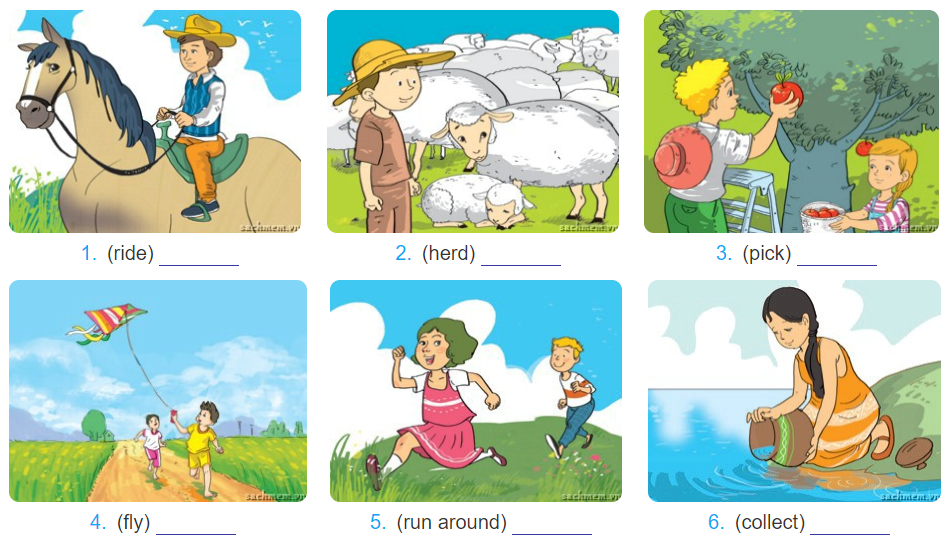Looking Back
Nội dung lý thuyết
Các phiên bản khácUnit 2: Life in the countryside
Looking back
Vocabulary
1. Use the words and phrases in the box to describe the pictures. Some words/ phrases may be used for more than one picture.
Sử dụng những từ và cụm từ trong khung để miêu tả hình ảnh. Vài từ/ cụm từ có thể được dùng nhiều hơn cho một bức hình
| colourful peaceful nomadic life vast quiet inconvenient gerpasture cattle rice horses paddy fields harvest time |

- Picture a: peaceful, vast, quiet, pasture, paddy field
The scenery is so peaceful and quiet. There are vast lands and few people. It’s really a typical view of the countryside.
- Picture b: quiet, colourful, paddy field, harvest tune, rice
It’s harvest time now. There are many colourful rice paddy fields in the picture. The country looks so picturesque. Some people are working on the fields. Their work is hard and their lives may be uncomfortable. However, life in the country í very quiet and peaceful. After a hard day, they can relax without thinking so much about other complex problems like in the city.
- Picture c: peaceful, vast, quiet, nomadic life, inconvenient, ger, pasture, cattle, horses
There are a lot of cattle on the pasture. Nomadic life is hard and inconvenient. They put up some tents to stay in. They useally move to look for grasslands for their cattle. These cattle are very important to them because they provide them with many necessary things. Nomadic children can ride horses and help their parents a lot. It’s a hard but interesting life.
2. Look at each picture and write a sentence describing what each person is doing. Use the verbs in brackets.
Nhìn vào mỗi hình và viết một câu miêu tả một người đang làm gì. Sử dụng động từ trong ngoặc đơn.

Gợi ý:
1. A boy is riding a horse.
2. A man is herding his cattle.
3. A girl is picking apples from an apple tree.
4. The children are flying a kite on the fields.
5. The children are running around in the fields.
6. A woman is collecting water from the river.
3. Look at the pictures and complete the sentences, using suitable comparative forms of the adverbs in brackets.
Nhìn vào những hình ảnh và hoàn thành các câu, sử dụng hình thức so sánh phù hợp của trạng từ trong ngoặc đơn.

1. A lion runs _____ faster than_____ a horse. (fast)

2. The Great Wall was built _____ earlier than _____ the White House. (early)

3. Homes in the city are often _______better than_____ those in the countryside. (well)

4. A racing driver drives _________ more skillfully than _________ a normal motorist. (skillfully)

5. A house is _______ more beautifully _______ decorated at New Year ___ than __ during the year. (beautifully)
4. Read the situations and complete the sentences with suitable forms of the adverbs in brackets.
Đọc những tình huống và hoàn thành các câu với hình thức so sánh trạng từ phù hợp trong ngoặc đơn.
1. A horse can run 80km/hr while a camel can only run 12km/hr. (fast)
→ A horse can run __________ faster than a camel __________.
2. According to a survey, 75% of the population in the countryside are happy with their life. This rate in the city is only 47%. (happily)
→ People in the countryside live__________ more happily than those in the city ___________.
3. Unlike many other jobs, farmers depend heavily on the weather. (heavily)
→ Farmers depend ________ more heavily on the weather than people in many other jobs_________.
4. We are both bad at swimming but I’m better than my sister. (badly)
→ My sister swims _________ worse than I do ___________.
Communication
5. Work in groups.
- You are planning a trip to the countryside. Work together and answer the question:
- What will you do during the trip to the countryside?
- Write the answer in the table below.
Report your findings to the class.
Gợi ý:
What will you do during the trip to the countryside? (Bạn sẽ làm điều gì trong kì nghỉ ở quê?)
| Tên người | Hoạt động |
|---|---|
| 1. Tuan | go fishing (câu cá) |
| 2. Hoa | climb the tree (leo cây) |
| 3. Minh | swim in the river (bơi ở sông) |